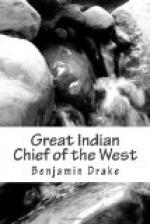The opinion has been expressed more than once in the course of this work, that there was in reality, no necessity for this war. A firm but forbearing course of policy, on the part of the United States, towards this discontented fragment of the Sacs and Foxes, would, it is believed, have prevented any serious aggression upon our people or their property. Certain it is, that a few thousand dollars, superadded to a humane spirit of conciliation, would have effected the permanent removal of Black Hawk and his band, to the west side of the Mississippi: and, as the government was not contending with them, in support of its national faith, nor about to punish them for an insult to its national honour, there could have been no disgrace in purchasing the settlement of the difficulty, on such terms. It has been stated that in the spring of 1831, Black Hawk agreed to remove his band to the west side of the Mississippi, and relinquish all claims to the lands upon Rock river, if the United States would pay him six thousand dollars, with which to purchase provisions and other necessaries for his people; and that the Indian agent at St. Louis, was informed of this fact. Moreover, it has been publicly alleged that before the campaign against Black Hawk, in the summer of 1832, the President and Secretary at War, were both informed, that the “British Band” of the Sacs and Foxes, could be peaceably removed to the west side of the Mississippi for six or eight thousand dollars. The secretary was assured, in the presence of a member of congress, that the inquiry had been made by a person familiar with the Indians, and the fact of their willingness to remove upon these terms distinctly ascertained.[12]
Under the treaty of 1804, the Sacs and Foxes ceded to the United States, more than twenty millions of acres of first rate land, for less than twenty thousand dollars. Black Hawk not only contended for the invalidity of this treaty, but insisted that the price paid by the United States was wholly below the value of the land. Under such circumstances, the course of the government was obvious—to have quieted the complaints of the Indians and secured their peaceable removal to the west, by a second purchase of their interest to the territory in question. Had it cost twenty, fifty or one hundred thousand dollars, to effect this object, our country would still have been the gainer, both by the preservation of the national faith and the national treasure—for the




